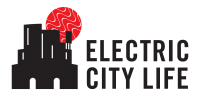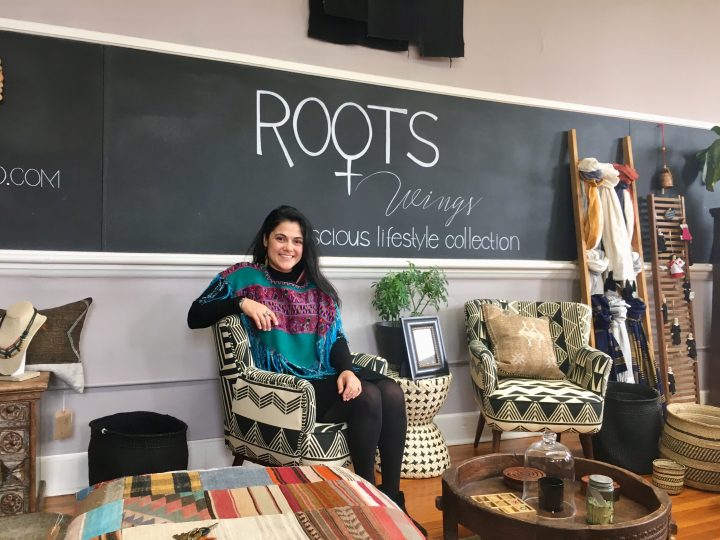
with Demetri Lopez
University lecturer, logistics consultant for activism worldwide & “conscious lifestyle” entrepreneur
How did Roots & Wings come to be?
“I’ve dreamt of Roots & Wings and had it as a vision for probably 20 years. I left Phenix City in 1997 when I graduated high school and went to the Middle East to have a gap year that turned into a gap few years.
This started my love affair with travel and cultures. Initially, I moved to Saudi Arabia and the next year started college in Dubai. And in Dubai, there was this store that had products from all over the world. I fell in love with this store and, particularly, with Indonesian and Indian furniture and textiles.
Since then, I’ve had this vision. At first, it was more of just an import store. But, as my career progressed and my personal interests progressed into feminists justice and human rights and artisan products, the vision shifted to an import store with a social mission.”
How would you describe that social mission?
“Roots & Wings is a retail space but my primary mission is not to sell products.
The mission is to create a safe space for women. I believe that women need safe spaces not just in the traditional sense to be political, to organize, but also safe spaces to align our values with our consumerism. A space to connect and learn about the work women are doing in different parts of the world. To support international women artisans and help them achieve economic independence.
Also, to help international artisans keep traditional and indigenous crafts alive. If the only things we buy are plastic and made by machines, then we won’t sustain these crafts and techniques that have been passed down from generation to generation. By buying, displaying, and selling these Guatemalan textiles, those women are able to continue those forms of sewing, weaving, knitting, etc.”
Why go through all the effort and expense of opening a brick-and-mortar store, when so much retail has shifted online?
“Anybody who knows me knows that 95% of my work is done online. From my laptop and office here in Columbus, I plan events all over the world. I don’t shop online. I don’t enjoy the online lifestyle that we have. I don’t have social media and it’s not something I’m all that fond of. What I want to achieve with this store can’t be achieved online. Talking to people. Sharing people’s stories.
One thing about moving back to Columbus and allowing me to live happily in a conservative part of the country has been meeting other progressives. Particularly, progressive women. So, it’s a little bit selfish—I want to meet these women. I set up shop in a residential part of town and I’m keeping my overhead costs really slow while I test this concept. I have no intention of doing anything online with this business at this stage. It’s completely people-to-people, women-to-women, driven.”
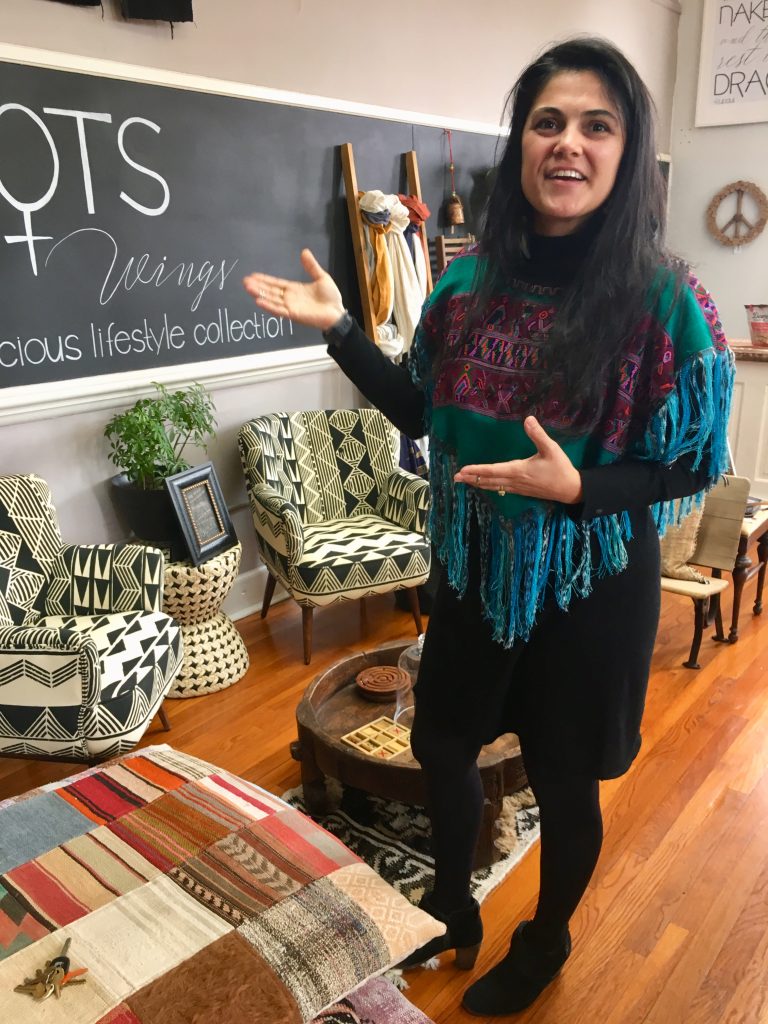
Roots & Wings
“Conscious Lifestyle Collection of Global Handmade, Fair Trade, Feminist Goods.”
627 Second Ave.
Columbus, GA 31901
11 a.m.-3 p.m. Fri. & Sat.
Or by appointment. Email demetri@rootsandwings.com to schedule.
You’re a lecturer at Troy University in the School of Social Work. What all is involved there?
“It’s one of the things I’m most proud of. I feel really blessed to do meaningful work every day in my role supporting the hard work of students. I have the easy role as a teacher.
I am a social worker and the values of our profession call on us to give back.
Teaching allows me to give back to my profession.
I teach primarily macro-classes—classes on diversity and on multi-cultural practice. I also teach Intro to Social Work. I love introducing people to social work. Sometimes I feel I’m trying to convince every student at Troy to major in social work.
I really love this profession. It aligns perfectly with my values. I love the cohort of students. It’s mostly women in this program, mostly women of color. Women who are kicking ass. Alabama women, particularly Alabama women of color, are getting it right. It’s a gift for me to be in a classroom learning from them.”
Tell us about your role as logistics consultant for Nobel Women’s Initiative.
“I’m a consultant for a lot of organizations and they’re one of my clients.
In the 120-plus years of the Nobel Peace Prize, very few women have received it. Like all work, women’s work is marginalized in the peace community as well. The Nobel Women’s Initiative was started 13 years ago by several women who won the Nobel Peace Prize. One is Jody Williams—the only American woman alive to have won. She started the International Campaign to Ban Landmines.
I helped them start this organization, which uses the visibility they have to spotlight work women are doing worldwide on feminine-justice issues.
For the last 10 years or so, I’ve helped them with logistics. Essentially, that means I plan convenings because organizations like this don’t have event planners on their team. They have policy experts, communication experts. But convening is a core strategy. They bring the best thinkers and best strategizers from around the world together in the same room to tackle important issues in the world. So, I’ve developed that expertise throughout my career and can help organize any type of event—fact-finding missions, human-rights delegations, etc.
I’m not an event planner and I take offense when someone calls me a an event planner. But being from the South and being trained in social-work—we’re trained to meet people where they are—allows me to plan events in a really unique way. Not in a way that emphasizes color of tablecloths. But in a way that emphasizes, ‘How do we create agendas and formats that feed strategy?’
International activists are coming to these from very different contexts. So I have to consider security, flights and travel, food, as well as getting to know individual activists and ensuring that their needs are meet when they come together to meet.”
What were your impressions of the recent Women’s March in Washington, D.C.?
“I attended the first march in 2017 and was there last month.
I love the solidarity that’s created and shared when we come together to march. It’s not just about a two-hour march. There are advocacy days as part of the march; the Women’s March released a legislative platform earlier in January.
It was different than January 2017—that was something really special for American women. Women around the world have been mobilizing and marching for years and years. Not so much for American women for several decades. 2017 was really powerful because we realized, ‘We have to take this country and our policies back.’
2019 was a little bit smaller—that was to be expected. I hope that doesn’t mean apathy is lurking. There was some controversy, which the media jumped on and villainized the organizers. Being in a movement together doesn’t mean we have to agree with each other on every single policy issue. Whenever we gave the opportunity to come together, it’s a good thing.
I’ve done marches all around the world and often there’s some local pushback. Government oppression. Security concerns. In D.C. this time, I saw some of the most horrific, hate-filled pushback. There were several groups—I won’t even say far right—I don’t know where they land on the spectrum—shouting ugly things about women and all marginalized groups. Shouting at children. I hadn’t experienced that before. It was disgusting. It was awful.”
How would you describe the current state of activism in Columbus?
It’s growing and it’s pat of the reason I decided to move back to Columbus.
Post-election, we were all shocked and paralyzed and ready to take action. I was deciding where my next move was going to be and decided to come back to Columbus because a friend called and said, ‘I’m going to send you a link. Women in Columbus are organizing!”
So, I feel it’s more active than it’s been in a while. But we need more. We have to be willing to be out in the streets, knocking on doors, canvassing. There are a lot of progressives in Columbus. We need to get out there more, myself included. Can’t leave it to other people and just think, ‘Someone else will do the work.’
If we’re going to change things in the next election, we have to start now. it’s up to us.”
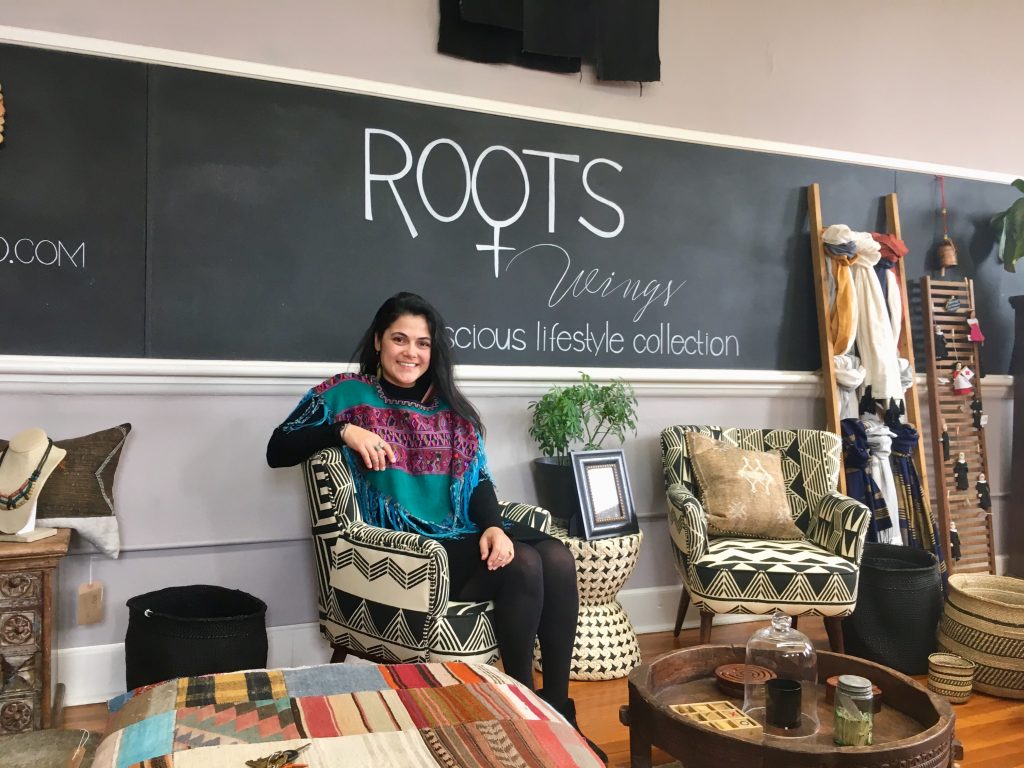
Age: 39
Book currently reading: “The Feminine Mystique. It’s the classic that I didn’t read in college like a lot of women did. So, I recently went into a local bookstore and asked about it and they said, ‘Hmm … Why don’t you try the self-help section?’ No, I said, let’s look in the political section first. Nope. No feminist political books. They were all in self-help, which I thought was complete BS, and I said as much. This isn’t self-help. This isn’t how to fix your relationship.”
Do you have a typical workday? “Yes. It is long. It involves at least 100 emails. It involves many conference calls, which means it starts really early to make an international call and ends really late to take an international call. It’s different everyday but one thing is the same: I probably get teary at least once a day from pure gratitude. I’m just so grateful to do the work that I love.”
Best concert ever attended: “Ani DiFranco at a small venue in Los Angeles with one of my best friends.”
If you could shout one thing to the world, what would you say: “Wake up.”
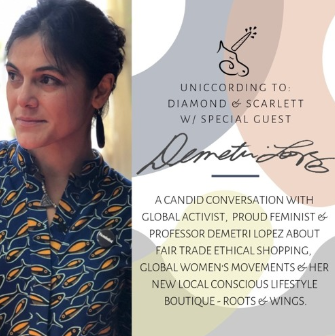
Listen to Demetri Lopez on the latest episode of the Unicord podcast.
